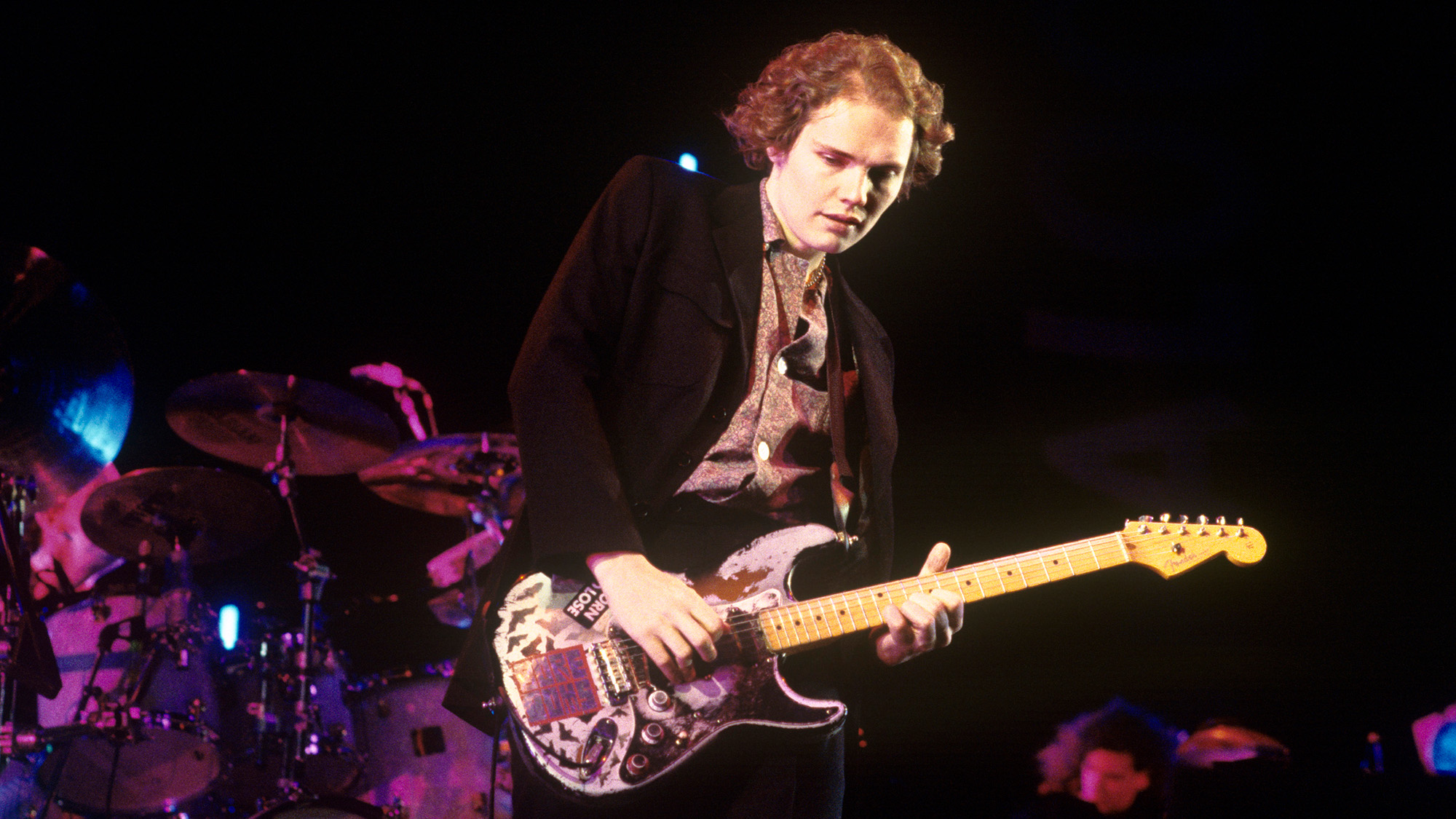Julien Baker: “I involve myself in different playing minutiae throughout different periods. I wanted my last album to sound like an ad for the Strymon BlueSky!”
The Memphis multi-instrumentalist talks musical investigations, overflowing pedalboards and discarding the looper pedals on her new album, Little Oblivions

Julien Baker is known as a grand master of introspection. While most musicians often try to escape their own head, Baker seems to dive to the sort of mental depths that induce the bends. Or at least that was how it used to work.
Across the lockdowns and social distancing of 2020, as the touring treadmill ground to a halt, Baker has found she is looking at her playing – and the world – in a new light. She has been back to school, writing a thesis on synaesthesia in music, she has deconstructed and rebuilt her rig and even taught herself how to use the monstrous Empress ZOIA pedal.
“I watched a three-hour tutorial,” she levels. I realized how little I knew about this whole world of modular synthesis. It gave me a whole different understanding of this one area of music and it was awesome. I've been doing a whole lot of that kind of stuff.”
Baker’s third album Little Oblivions was recorded before the pandemic, but it’s filled with full-band sound (albeit with all the instruments played by Baker), one that prefers possibilities to perfection – a significant step on from her flawless loop-laden singer-songwriter style.
The sessions have marked the start of a process that has continued throughout the last year: the sorting and scrapping of old ideologies in the search of something more freeing, in her music and her life in general.
You’ve talked about your musical ‘investigations’ during the 2020 lockdowns and how you previously oscillated between wanting to know all the theory and none of it. It feels like if you stick it out as a musician, eventually, you realize it's OK to flip between things, to have those contradictions… has that been your experience?
“Totally! And that's not just true of how I feel about music. Being able to step outside and get off the carnival ride of the pendulum swinging back and forth, to notice that these are the two ends of your thinking, it helps me come to things a lot more humbly.
All the latest guitar news, interviews, lessons, reviews, deals and more, direct to your inbox!
“You can look at both those things and be like, 'I don't know as much as I thought I did'. But you don't have to decide. You don't have to dictate your own relationship with music.
“It's like that with me and knowing how to think about the world, you know? I thought I had so many conclusions and I would have characterized myself as a very principled person. Being able to step outside of those values and being sure about things put me in a much more humble place, where I can just come to things and be wrong!"
I think we need people who are ready to be a bit more willing to be wrong in the world, in all areas. To not see it as weakness.
“I know! Or I don't know... [laughs] It’s chasing perfection. I thought so much about it, but it's crazy. Perfection is unattainable, everybody knows this and I would never have called myself [on it before the pandemic] because every night I made like five jillion mistakes and, when I was still touring, I would walk offstage and just scream into the big rubber trash can in the wings!
I have this thing where I'm super uncomfortable with the attention and then create this music and tour it where the attention is hyper-focused on me during my set!
“I'd be like, 'I fucked up! I can't believe it!’ Then I would practice and practice. I'm practicing today, but now it's because I'm comfortable learning new things. It’s not like it was.”
I read a piece in Vice in which you discussed getting a piano note wrong during this spotlight moment at one gig. You talked about it like this calamitous event.
“I just found it so scary. I have incredible stage fright and it was just me playing piano alone. I have this thing where I'm super uncomfortable with the attention and then create this music and tour it where the attention is hyper-focused on me during my set! It was like, 'If I hit a note wrong, you're gonna know!'
“Now, when I have a rehearsal with guitars, bass, keys, drums, there's a bit of room there. Have you ever played in a band where somebody can tell you're fucking up and they like pick you up?
“They go, 'I'm just going to play this thing because you dropped out, so we're going to work together to fix this.' It's such a cheesy analogy but it becomes way easier that way.

“Now I can sit down and hang out with somebody who doesn't play as well and be like, 'Think about doing this...' But when there's a music theory geek, like, obviously struttin' – I do this, too, I'm so guilty of it – but you know when someone dispenses some heavy music or audio theory to just let you know that they know about it? [laughs]
“When I see people doing that, now I can sift through all the stuff that's irrelevant and get to the part that's useful. That's a good practice with anybody.”
Somebody said to me the other day that they've come to realize that the smartest person in the room is usually the one saying, 'I don't know...' They weren’t talking about music, but the principle holds, I think…
“Completely! And not to turn this metaphor into a meta-five, but let's say I go to a music school and I learn the rules of the major scale, if I played a flat or natural note that would be wrong. But it's only wrong in so far as you don't know how to integrate it yet.
“Some things will sound atrocious, but in some keys it's interesting… It’s like, I struggle a lot with being obsessive-compulsive and having anxiety disorder and I would think so much about stuff – whether it's in the Bible or [Hindu scripture] the Bhagavad Gita, or an organizer on Twitter telling you about social theories.
“I was devouring all this information and trying to make all these rules about what is the right way to go about being in this crazy world. Then I was trying to be like, 'Here's this thing I've just found out. I'll try to get people to do my thing.'
Some things will sound atrocious, but in some keys it's interesting…
“[I’ve realized], it's not the only way. It's the same with proper scales and chords and that you have to have a chord resolve 'like this'. It's the same with this idea that you have to go to college, get a job, have babies, be somebody's wife – preferably, a man – go to church. You have to vote Republican. You know what I mean?
“It's these expectations that are set up by your social environment. Yeah, I need to learn things and find a way to provide for myself, but you can break things off according to their value [to you], instead of this binary system of 'that's true or untrue.'”
For this record, you've talked about removing that single spotlight approach – taking the pressure off it just being you and the acoustic and bringing in more instrumentation. However, you've also played everything on it and co-produced the record, so it's more 'you' than ever before. What was behind that decision?
“I've been thinking about this so much. It’s another peg in the ladder of changing – that instead of being like ‘that’s an interesting drummer, let’s get them in’, I was still like ‘I definitely have the best ideas about what sounds to make!'
“I realized that with Sprained Ankle, I'd released those songs out of my dorm for no-one and they were sparse because that was what was available to me. I had a looping pedal because I was in a different city to my band and I didn't know anyone.
“Then on Turn Out The Lights, I was like, 'OK, I find that I enjoy the minimalist setup and I think it challenges me to be a better songwriter.’ I was obsessed with making the best record I could.
“It's crazy, because I look back at it now and think that was an OK record but I spent so much time agonizing over how I was going to steward this thing. I don't know why I saddled myself with all of those expectations.
“Then I grew and I realized how much less my philosophical convictions about art matter and that I should just make songs that sound cool and say what I want them to say.”
How has this changed the way you think about your guitar playing now?
“Oh, man. I think it's like I've been saying throughout this conversation, I went through a phase where I had like six reverbs on the 'board and I remember a guy I was touring with one day was like, 'I see you pressing all those buttons and I don't hear how they're different!'
I have this thing where I do stuff the hardest way, because it's the first way I figure out how to do it
“So I will involve myself in different minutiae about my playing throughout different periods. On Turn Out The Lights I wanted everything lush and pretty – I wanted it to sound like an ad for the Strymon BlueSky! I got that.
"Now with my playing I realize that I don't have to loop everything and make every single layer myself. It's like, 'Wow, I can devote all this time to making one part great, instead of keeping rhythm with the eight loop layers.'
“I can be a lot more discerning about my tone, too. I got this Orange Rocker 32 and it's got this Dry and Wet channel. I've learned about how an effects loop works and I've got this patch bay trick where I have the signal split in two, but I have a kill-switch for the wet. It's so much easier.
”I have this thing where I do stuff the hardest way, because it's the first way I figure out how to do it. So before I'd try to shut literally eight pedals off at once. I'm not joking.
“The crew calls [my 'board] 'the spaceship' and I was like on one leg all the time. I've had moments at festivals where I'm like, 'I'm falling down right now!'
“Now I've had the time to reevaluate how I play and why I play the way I do, because the whole day is not taken up with getting to the next city and getting this not-ideal system to work again. I just have so much more bandwidth.”

You were previously using Fender combos. Why the switch to the Orange?
"I think with the Fenders, to me it's like cooking in an iron skillet, where you're supposed to let the grease and everything put its own flavor on whatever you're cooking.
“I kind of miss the warmness from the Fender amp, so I might do the stereo from the Orange and then also have a Fender amp, but I feel like that might be a guitar player in the realm of 'too extra'!
“But instead of the greasy skillet, the Orange is like this pristine, brand new copperplate pan. You put broccoli in there and it's going to taste like broccoli!”
Are you still using Telecasters on this record?
"Yeah, it's just a workhorse guitar. I got a Tele when I was 18 and really liked it and it was the most comfortable I had been with the sound of a guitar, so I just stayed with them. I have one Mexican Tele with a classic Tele neck/bridge [configuration].
“Then I also have a Thinline, which is a Moollon. They're better known for basses, but the dude who works there built this Moollon Thinline Telecaster-style guitar that I love. It's something different.
I interact with music in so much more of a personal and fulfilling way now that success would just be getting to play some shows with my friends
“Then I have a blonde one that I got from Fender, which has coil taps. I'm not a real big fan of coil taps on a Tele. I've been playing delicate, reverb-y music for so long that I realized – man, when I listen back to sessions, like I'm an old quarterback watching games – the Tele sounds so thin and un-powerful.
“So I got this guitar with the coil-taps and took those out, then I put in a Lollar soapbar-style in the neck and it's so awesome. It's like a maple fret/butterscotch body and it sounds like the perfect amount of gentle crunch and then there's a mod in there to run the pickups in series or parallel.”
It feels like we’ve all been a little humbled this year. Against that sort of backdrop, what would success look like for Little Oblivions?
“I've lowered my expectations, too, but I think not in so much of a cynical way, more in making peace with the fact that music is going to look different moving forward. But things have made music look different plenty of times. They showed Elvis below the waist and the world freaked-out.
“The Beatles. MTV. So many things have changed music and right now these things are changing more than music, they're changing humanity. I feel like the older I get, everything that feels enormous right now, I will look back on and be like, 'Yeah. And then we all just moved on.'
“I interact with music in so much more of a personal and fulfilling way now [since the pandemic] that success would just be getting to play some shows with my friends Matt and Calvin and Aisha and Jake, with my band. Getting to tour again – and see other people.”

Matt is Deputy Editor for GuitarWorld.com. Before that he spent 10 years as a freelance music journalist, interviewing artists for the likes of Total Guitar, Guitarist, Guitar World, MusicRadar, NME.com, DJ Mag and Electronic Sound. In 2020, he launched CreativeMoney.co.uk, which aims to share the ideas that make creative lifestyles more sustainable. He plays guitar, but should not be allowed near your delay pedals.
